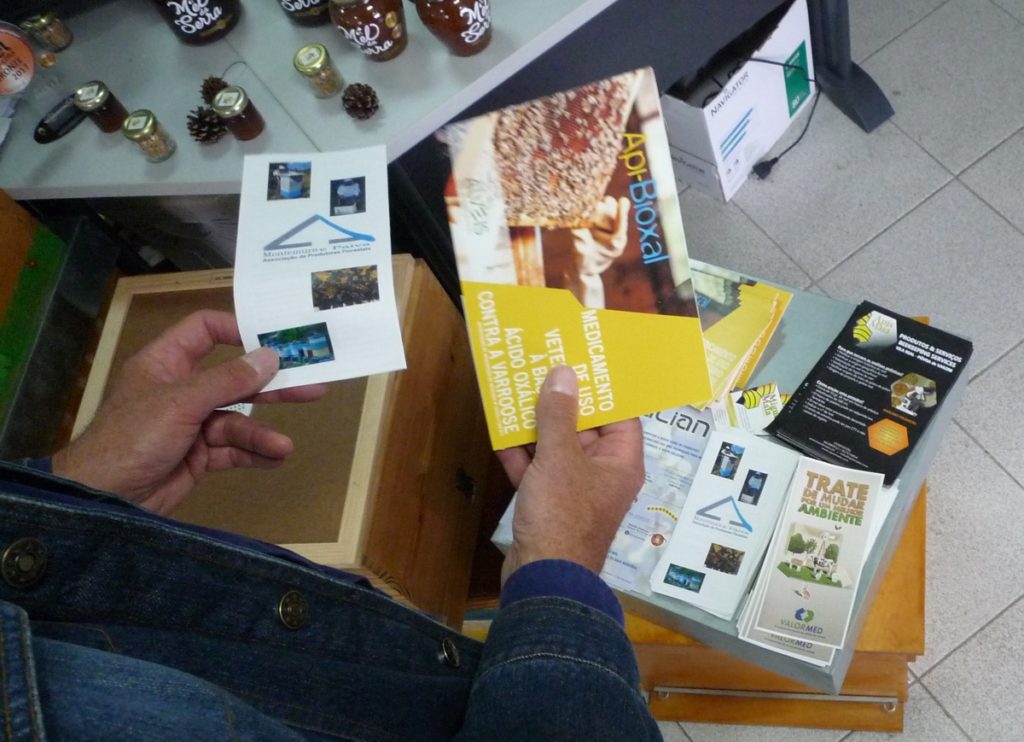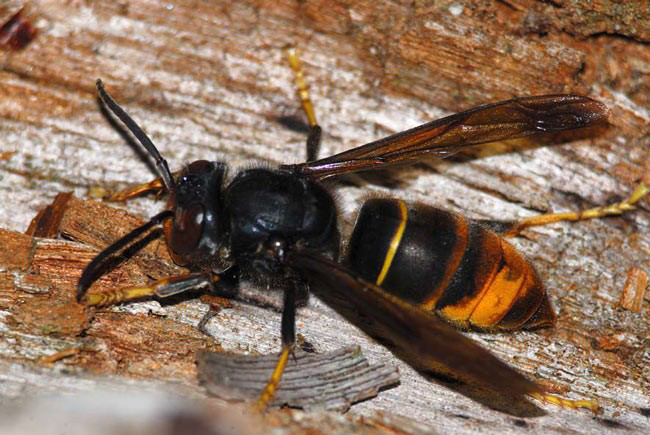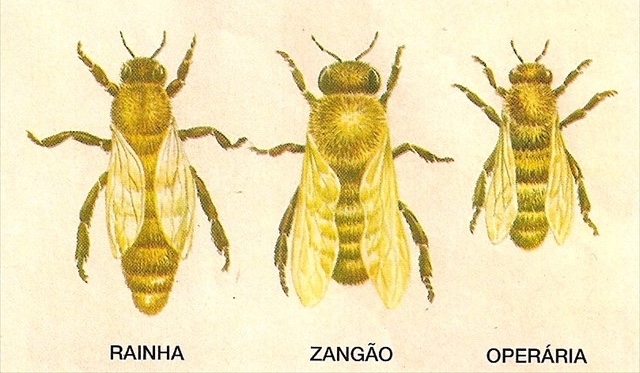After we were surprised by a bee swarm in the garden (see earlier post), we searched for information about beekeeping in Portugal.
Our first findings:
- a hive must be at least 100 meters from the public road and from buildings (except the beekeeper’s house)
- the number of the beekeeper must be visible at every hive
- every beekeeper must be registered at the DGVA, the Portuguese animal health authority
- the biggest threats to honeybees are the varroa mite and the Asian hornet in Portugal
- today is the day of the beekeeper! (May 22nd)
The Portuguese beekeeping association
We also found that the nearest beekeeper shop/company would be in Castro Daire. The location was not entirely clear.
Fortunately, they knew where we had to be at the local co-op. Below the football stadium …
And yes indeed, a few organizations have an office on the first floor of the football stadium. Next to Radio Montemuro I see the word apicultura on the door; beekeeping.
Inside, a woman sits behind a desk surrounded by papers, bee stuff, jars of honey, pollen, and a large pile of PET bottles.
We turn out to be in the right place. Mónica is the technical advisor for the beekeepers of this region. She is that on behalf of the beekeeping association of Portugal (FNAP). And she can register us in the DGVA register.
While she registers us, we discuss a lot more about beekeeping in Portugal.
There are 17,000 beekeepers in Portugal, almost all of whom are hobby beekeepers. There are only a few professional beekeepers who generate an income from the sale of honey, pollen and propolis.
Every beekeeper has a registration number. The registration is mandatory. For registration, Mónica asks for our NIF number, a document with the NIF number and our address, an ID and the location of our bees. When we show where we put our bees on google maps, Mónica frowns. Officially it’s too close to the road. She picks another spot in our garden: solved.
We get registered with the IFAP, an institute supporting agriculture and fishing. And then in the registo da atividade apícola. This is also the registration number that we have put in our apiary.
Zona Controlada

We belong to the Montemuro & Paiva region. This region has been designated by the ministry as a ‘zona controlada’. In these zones, honey bees are systematically checked for bee diseases. Therefore we receive a “boletim de apiário”. This is a kind of bee log that we have to keep. I am reminded of the bee-card that we had to fill in during the bee course in the Netherlands.
If we understood correctly, we receive a call every once in a while to take samples from our bees or to participate in the control programs. It seems to be that the treatments to control varroa are provided. In practice, we will notice how that works exactly. Varroa is being fought here at the end of the summer / fall.
The Asian hornet

Mónica is especially concerned about our bees by our location. The valley in which we live has an abundance of water and tall trees: perfect for the Asian hornet. And that is true, we regularly see hornets. She says that in 2018 the municipality of Cinfaes cleared 500 nests from the Asian hornet. That is dangerous work, which happens overnight. The nests can have a size of 1 meter height and 1 meter wide. And a hornet can stab several times… In the night when all hornets are inside, a cloth is stretched over the nest and then completely burnt out with a flame thrower.
At this time of the year, the queens of the hornets have just started building their nest. That’s why it’s good to kill them with a trap. That turns out to be those PET bottles. We get a recipe for the bait. A cocktail of white wine, beer, grenadine and a shot of liquor. Cheers, that has to do the job!

A hornet trap.
The cocktail is served below. The recipe is adjusted to the season.
The hornet smells the cocktail and flies into the upper left or right opening. Then she climbs down to drink. But then she can’t fly out again, because her wings are to big to get through.
After an hour we are completely ready to keep bees in Portugal.
But our little swarm, kept us waiting. At the first control-check I didn’t see any eggs. Did the virgin queen get fertilized?
Today I dared to look again: Yahoo! Closed brood cells, larvae and eggs. And the queen herself also showed up for a moment.
So now I have to update my “boletim de apiário” soon. In Portuguese…
| honeybees | abelhas |
| a swarm | um enxame |
| wooden hive | colmeia |
| combs | favos |
| queen | rainha |
| work bees | as abelhas operárias |
| drones | os zangões |
| wax | cera |
| bee feeder | alimentador |
| brood frames | caixilho de cria |
| frame | caixilho |
| brood | criação |
| larva | larva |
| eggs | ovos |
| cells capped | células coberta |



How’s the bees.?
They’re alive and busy!
Excellent news.!
We are planning on moving to Portugal soon and bee keeping is on the list.!
Thanks for the information 👍
Good luck.
De nada e boa sorte!
Hi, i enjoyed reading this post.
we have 3 hives and we live close to celorico da beira (guarda dist.)
we ar enew in portugal and i will appriciate it if you can give me a location for a office close to me for registration..
have a great day.
Shay
Hi Shay, glad you liked the post.
I had a look at the website of Fnap, the national federation of beekeepers. I think their nearest office to you is in Gouveia:
http://fnap.pt/org-apicultores-associadas/associacoes/associacao-dos-apicultores-do-parque-natural-da-serra-estrela/
Good luck to you and your bees, enjoy Portugal. You live in a nice area.
thank you very much.
Hi I’m from India I know everything about bees. l am thinking I start honey bee business in Portugal what u think
Hi Rinku,
thanks for the comment. Personally, we would never start a bee business, because we like to stay amateur beekeepers with just 3 colonies, maximum.
But I think it is possible to start a bee business here. Especially in the countryside, where lots of people left their homes to live in the city, you will find good properties with land for cheap prices and clean water resources.
There might even be a funding programme to help you start your business, in the form of a micro-credit.
Boa sorte! (good luck!)
Great reading, I like the blog.
Arriving in Portugal this spring and first on the list is get a hive and some Bees. Just wondering if you had any advice on keeping them cool in the summer? Was thinking of placing the hive under a big cork tree.
Moving to Portalegre district in Alentejo.
Obrigado
Faj
Hi Faj, Thanks for the compliment.
Here, up in the North, we don’t really have to worry about the heat so much for the bees.
And I am not sure if you have to worry about it. I would think the bees can organize that themselves, as long there’s enough cool freshwater around.
A place in the shadow sounds logic though. And depending on the wooden hive you have, you might be able to take out the bottom/drawer of the hive.
hi
this is interesting, but worried about the “a hive must be at least 100 meters from the public road and from buildings (except the beekeeper’s house)”
I have a decent yard, but to be 100m from the public road (does that also include a travessa) and other houses, that means you almost have to live “isolated”. My house is free-standing but there are neighbors around so this probably will never work then 🙁
Hello Dominique,
Thanks for your reply.
I think it is up to you to decide if the hives can cause trouble. Our bees and a lot of bee stables in our surrounding are nearer to the public road then 100m. Bushes and trees can form a save border between hives and a public road.
Hi
I am in the Algarve. I’m excited to keep Bees and am looking to purchase a flow hive. A lot to learn but does anyone know where it is possible to get queens and/or information on keeping Bees?
Hi Charlie, Thanks for your comment.
Maybe this is a good starting point for you, the local group of the Portuguese beekeepers association:http://fnap.pt/org-apicultores-associadas/associacoes/melgarbe/
Or ask around in the local café, a beekeeper in your neighbourhood or facebook.
Boa sorte!
Hi Charlie
I too am living in Algarve (Carvoeiro) and also want to purchase a Flow hive. I have never owned a hive before and really excited to try.. I have no idea where to start.
Thank you both, I didn’t know the concept of a ‘flow hive’
But those boxes are expensive! I found a portuguese company that sells them.
https://beesweet.pt/loja/colmeia-completa-nao-evasiva-flow-hive
Good luck with that. Keep us posted about you first honey harvest with this hive
Abraço!
Hi,
love the blog very interested in keeping Bees. My issue is do I have to register my hives and if I have neighbours legally how far from their house do I need to place hives?
best regards
Ben
This is in Portuguese what’s in the law:
50m from public road
100m from any other building
400-800m in between bee farms (depending on the amount of hives)